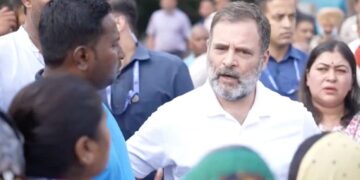In response to petitioners’ reminders that the court would “step in” if the Special Intensive Revision (SIR) led to “mass exclusion,” the Supreme Court said on Tuesday, August 12, 2025, that “mistakes” may have been made in the creation of the draft Bihar electoral roll and referenced the Election Commission of India’s (ECI) readiness to fix those.
“My Lords promised you would step in if there was a mass exclusion,” senior lawyer Gopal Sankaranaryanan said during his appearance before a bench of Justices Surya Kant and Joymalya Bagchi on the first day of hearings in the challenge to the SIR. “This has happened. Sixty-five lakh people have been excluded from the draft electoral roll published on August 1.”
Speaking on behalf of the election body, senior counsel Rakesh Dwivedi stated that mistakes will inevitably happen “here and there.” “This is a draft roll. It can be corrected by the Booth Level Officers,” he stated.
“In a small constituency, 12 people left out as dead were found alive,” stated senior counsel Kapil Sibal, who spearheaded the petitioners’ cause.
Justice Kant questioned Mr. Sibal about whether the petitioners desired a “roving inquiry” and at whose request. At the same time, Mr. Dwivedi stated that the petitioners were more eager to be an “obstruction” and engage in speculation. Justice Kant told Mr. Sibal to provide a list of names of genuinely aggrieved people, assuring that action would be taken.
According to Mr. Sibal, a greater portion of Bihar’s population lived in poverty. It lacked the documents required by the ECI to verify citizenship and be added to the voting roll.
On behalf of the petitioners, senior advocate A.M. Singhvi argued that several records would have been lost as a result of migration, floods, and other circumstances. According to him, the majority of people in Bihar do not have digital copies of their paperwork.
“Determination of citizenship is not the role of ECI. If crores of people in Bihar are already on the electoral roll, the poll body cannot ask them to produce documents to prove their citizenship again. This amounts to presumptive exclusion,” Mr. Singhvi contended.
Only 3.05% of Bihar’s population, according to Mr. Sibal, possessed birth certificates, one of the 11 “indicative” documents that the ECI requires.
However, Justice Kant rejected the argument, stating, “Bihar is a part of India. If people in Bihar do not have these documents, other States would also not have… These are documents which show a person is a bona fide resident of a State. Once you show the documents, the burden will shift on the ECI,” noted Justice Kant. Mr. Sibal was advised by the judge to refrain from making “sweeping statements.”
“On a conservative estimate, 6.5 crore electors need not produce any documents as they are already in the 2003 electoral roll,” Mr. Dwivedi stated.
However, when a brief revision of the Bihar electoral roll took place in January 2025, Justice Kant did enquire as to why a SIR was now necessary.
According to activist Yogendra Yadav, who made an in-person appearance, SIRs are ineffective worldwide. According to him, a quarter of the population—mostly the poor and marginalised—tend to be left out whenever the burden of inclusion in the electoral roll moves from the state to the people.
According to Mr. Yadav, there is no way to compare the 2003 extensive modification of the Bihar voters’ list with the present SIR. The latter occurred during the period when voting was conducted using computers.
“Records were being computerised.” Officers were handed printouts and instructed to visit each home to confirm. This assumption of exclusion and the need to complete the enumeration forms are now unique. The Bihar SIR might be the biggest disenfranchisement in any democracy’s history, not only in India’s. “This is not an issue of revision, but a tectonic shift in the burden to the voters,” he stated.
The poll panel, according to advocate Prashant Bhushan, has the precise number of people removed from the draft roster as well as the justifications for their removal, which include death, traceability, duplication, and permanent relocation within the state. It isn’t disclosing the specifics, though. According to him, numerous enumeration forms of deleted individuals said that “BLOs have not recommended” their names on the voters’ list without providing an additional explanation.





















































